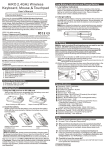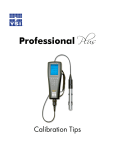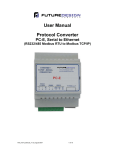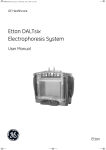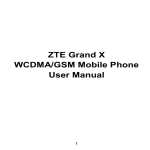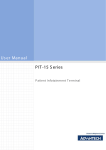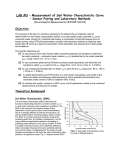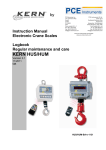Download ProOBOD Users Manual
Transcript
USE R MA N UA L C ontents Warranty............................................................................................................... i Introduction........................................................................................................ 1 Getting Started.................................................................................................... 2 Unpacking the OBOD Probe.............................................................. 2 ProOBOD Operation......................................................................................... 4 Connecting Probe/Cable Assembly to Instrument.......................... 4 Configuring the ProODO Instrument.............................................. 4 Powering the Stirrer............................................................................. 5 Calibration - Dissolved Oxygen......................................................... 5 Temperature......................................................................................... 7 Taking Measurements.......................................................................... 7 Maintenance and Storage................................................................................... 8 Updating Instrument and Probe Firmware....................................... 8 Sensor Maintenance - Dissolved Oxygen.......................................... 8 Sensor Maintenance - Temperature................................................. 11 Sensor Storage.................................................................................... 12 Troubleshooting................................................................................................ 12 Dissolved Oxygen Readings.............................................................. 12 Help .................................................................................................... 13 Error/Status messages . ..................................................................... 13 Restore Default Calibration Values ................................................. 14 Probe Specifications.......................................................................................... 15 Accessories / Parts List..................................................................................... 16 Declaration of Conformity............................................................................... 17 Item #626471 Rev B Drawing # A626471 September 2010 ©2010 YSI Incorporated. The YSI, ProODO, OBOD and ODO logos are registered trademarks of YSI Incorporated. Recycling............................................................................................................ 19 Contact Information......................................................................................... 20 Ordering and Technical Support...................................................... 20 Service Information........................................................................... 20 Appendix A-DO% Calibration Values............................................................ 21 Warranty The YSI Professional OBOD® (ProOBOD TM) probe and cable assembly is warranted for two (2) years from date of purchase by the end user against defects in materials and workmanship, exclusive of batteries and any damage caused by defective batteries. ProOBOD sensor caps are warranted for one (1) year from date of purchase by the end user against defects in material and workmanship. ProOBOD systems (instrument & cable/probe assemblies) are warranted for 90 days from date of purchase by the end user against defects in material and workmanship when purchased by rental agencies for rental purposes. Within the warranty period, YSI will repair or replace, at its sole discretion, free of charge, any product that YSI determines to be covered by this warranty. T his page left intentionally blan k To exercise this warranty, call your local YSI representative, or contact YSI Customer Service in Yellow Springs, Ohio at +1 937 767-7241, 800-897-4151 or visit www.YSI.com for a Product Return Form. Send the product and proof of purchase, transportation prepaid, to the Authorized Service Center selected by YSI. Repair or replacement will be made and the product returned, transportation prepaid. Repaired or replaced products are warranted for the balance of the original warranty period, or at least 90 days from date of repair or replacement. LIMITATION OF WARRANTY This Warranty does not apply to any YSI product damage or failure caused by: 1. Failure to install, operate or use the product in accordance with YSI’s written instructions; 2. Abuse or misuse of the product; 3. Failure to maintain the product in accordance with YSI’s written instructions or standard industry procedure; 4. Any improper repairs to the product; 5. Use by you of defective or improper components or parts in servicing or repairing the product; 6. Modification of the product in any way not expressly authorized by YSI. THIS WARRANTY IS IN LIEU OF ALL OTHER WARRANTIES, EXPRESSED OR IMPLIED, INCLUDING ANY WARRANTY OF MERCHANTABILITY OR FITNESS FOR A PARTICULAR PURPOSE. YSI’S LIABILITY UNDER THIS WARRANTY IS LIMITED TO REPAIR OR REPLACEMENT OF THE PRODUCT, AND THIS SHALL BE YOUR SOLE AND EXCLUSIVE REMEDY FOR ANY DEFECTIVE PRODUCT COVERED BY THIS WARRANTY. IN NO EVENT SHALL YSI BE LIABLE FOR ANY SPECIAL, INDIRECT, INCIDENTAL OR CONSEQUENTIAL DAMAGES RESULTING FROM ANY DEFECTIVE PRODUCT COVERED BY THIS WARRANTY. i I ntroduction Thank you for purchasing the YSI Professional Optical Biochemical Oxygen Demand (ProOBOD) probe. The ProOBOD is designed for use with a YSI ProODO® instrument. The probe will not work with any other YSI instrument. This manual provides information on the ProOBOD probe only. For more detailed instructions on how to operate the ProODO instrument, please refer to the ProODO User Manual (www.ysi.com/ProODO). The ProOBOD is designed to fit in a standard 300 ml BOD bottle as well as other international BOD bottles, depending on the version of the probe. YSI offers two probe versions: T his page left intentionally blan k • ProOBOD USA (Japan), YSI item number 626400 - This probe fits in standard USA and Japanese style BOD bottles. A power supply for USA and Japanese style AC outlets is included. • ProOBOD International, YSI item number 626401 - This probe fits in standard BOD bottles used outside the USA and Japan. A funnel adapter for fitting in standard UK BOD bottles and a switching power supply with 3 international outlet adapters are also included. The ProOBOD sensor measures dissolved oxygen in water using lifetime luminescence technology and uses a digital signal to send information between the instrument and probe. The probe features a stirrer and motor to aid in sample movement, to keep solids from settling at the bottom of the sample bottle, and to speed up the response of the sensor. Key advantages of the ProOBOD’s use of optical technology for DO measurement over traditional electrochemical methods include the elimination of sensor flow dependence and sensor warmup time, greater stability, the ability to zero the sensor for more accurate measurements at low dissolved oxygen levels, and the elimination of frequent membrane/electrolyte changes and electrode servicing. For more information on the ProODO instrument and product specification, please visit www.ysi.com/ProODO or contact Technical Support at 800-8974151 (+1 937 767-7241). Reading the entire manual before use is recommended for an overall understanding of the probe’s features. u ii Important: The ProOBOD is designed for laboratory use, not field use. It is not waterproof and should never be immersed in a sample past the taper on the stem of the probe. 1 G etting S tarted Throughout the manual, the term “probe” refers to the end of the cable where the sensor, stir motor, and stirrer are located. The term “sensor” refers to the Optical Dissolved Oxygen sensing portion of the probe assembly and the term “sensor cap” refers to the removable sensing cap that is replaced about once per year (Figure 1). Stirrer toggle switch, turns stir paddle on and off Probe Temperature sensor Optical DO sensor Stir paddle OBOD Sensor Cap, shown here removed from probe Remove the ProOBOD cable/probe assembly from the shipping container and locate the instruction sheet that is included. This instruction sheet is important because it contains the calibration coefficients for your sensor cap. After using this sheet for general probe setup, be sure to store it in a safe place in case you need to reload these calibration coefficients in the unlikely event that they are ever deleted from the instrument and probe. i Note - A new cable/probe assembly already has a sensor cap installed and the sensor cap coefficients are preloaded into the probe at the factory. Preparing the probe for the first time: 1. A new ProOBOD probe will have a clear protective cover placed over the sensor cap to ensure the cap remains moist during shipment. Carefully remove this clear cover from the end of the probe by pulling it straight off the sensor. Save the clear cover along with the sponge in case you want to use it later for long term storage of the probe. 2. Place the probe in a standard BOD bottle that contains a small amount of clean water (approximately 40 ml). The sensor should not be immersed in water but rather in the air above the water. The purpose is to create a 100% water-saturated air environment for the sensor which is ideal for calibration and storage when not in use. u It is important to always keep your sensor in a moist environment so the sensor cap does not dry out. (See Maintenance and Storage for more information.) Figure 1. Unpacking the OBOD Probe i Each ProOBOD probe and replacement OBOD sensor cap includes an instruction sheet with important information unique and specific to each individual sensing cap. Carefully unpack the instrument and accessories and inspect for damage. Compare received parts with items on the packing list. If any parts or materials are damaged or missing, contact YSI Customer Service at 800-897-4151 (+1 937 767-7241) or the authorized YSI distributor from whom the instrument was purchased. 2 3 P r o O B O D O peration Connecting Probe/Cable Assembly to Instrument To connect the cable, align the keys on the cable connector to the slots on the instrument connector. Push together firmly, then twist the outer ring until it locks into place (Figure 2). This MS-8 (Military Spec) connection is waterproof. sensor cap’s usable life, turn the instrument off when not in use. For example, turn the instrument off over night, but not between readings. The sensor cap will also need replaced if it is damaged or cracked. See the Troubleshooting section of this manual for instructions on how to determine if the sensor cap needs replaced. See the Sensor Maintenance - Dissolved Oxygen section of this manual or the instruction sheet included with the replacement sensor cap for instructions on updating the Sensor Cap Coefficients. When updating the Coefficients, the sensor cap serial # will be updated automatically based on your entries. The Temperature Coefficient should not be modified unless instructed by YSI Technical Support. For additional information about the ProODO’s menus and operation, please refer to the ProODO User Manual. Powering the Stirrer Figure 2. Note the keyed connector. The cable and instrument connectors can only be mated once the keyed sections are properly aligned. Configuring the ProODO Instrument On the ProODO instrument, press the Probe key. Highlight DO and press enter. Enabled allows you to enable or disable the DO sensor. Highlight Enabled and press enter to activate or deactivate the dissolved oxygen sensor. The DO Setup menu also displays the OBOD probe’s SW Version and Serial #. This information is programmed into the probe at the factory and digitally sent to the instrument when the cable is connected. Within the DO Probe Setup menu, the Sensor Cap submenu allows you to view and enter information specific to the sensor cap installed on the probe. Highlight Sensor Cap and press enter to view the sensor cap’s Serial #, Temperature Coefficient, and Sensor Cap Coefficients. This information is also programmed into the probe at the factory and sent to the instrument when the cable is connected. To power the stirrer, locate the power supply that was included with the ProOBOD. The power supply for the USA/Japan probe is labeled model number 6260. The power supply for the international probe is labeled model number 6261. Next, connect the power supply to the probe’s power connector and then plug the power supply into an outlet. The international ProOBOD is shipped with outlet adapters to connect the power supply to a variety of outlets. The stirrer can be turned on and off with the toggle switch located at the top of the probe (Figure 1). Calibration - Dissolved Oxygen The ProOBOD sensor is an optical luminescent sensor which has greater stability and is less susceptible to calibration drift than traditional electrochemical sensors. This increased stability means that the instrument may hold its calibration for many months. However, for the highest data accuracy, YSI recommends verifying the instrument’s calibration on a daily basis. To verify the instrument’s calibration, place the sensor in its calibration environment and check to see that the DO% is reading its calibration value based on the current barometric pressure. Refer to Appendix A for a list of DO% calibration values and corresponding barometric pressure readings. The Sensor Cap Coefficients need to be updated when the sensor cap is replaced. The frequency of sensor cap replacement is dependent on use. For example, when the probe is powered on for approximately 4 hours per day, 5 days a week, the sensor cap will need replaced about once per year. If the probe is powered on more than this, the sensor cap will need replaced more often. To extend the The ProODO instrument with ProOBOD probe offers several options for performing a dissolved oxygen calibration. For both ease of use and accuracy, YSI recommends performing a DO % water-saturated air calibration as described below. For information on other acceptable calibration techniques, including how to perform a 2-point calibration with a zero solution, please refer to the ProODO User Manual. 4 5 i It is not necessary to calibrate in both % and mg/L or ppm. Calibrating in % will simultaneously calibrate mg/L and ppm and vice versa. Calibrating DO% in Water-Saturated Air: 1-Point Calibration Make sure there are no water droplets on the OBOD sensor cap or temperature sensor and then place the probe in a BOD bottle that contains a small amount of clean water (approximately 40 ml). The BOD bottle should be clean since bacterial growth may consume or produce oxygen which would interfere with the calibration. Make sure the DO and temperature sensors are not immersed in water. The purpose is to create a 100% water-saturated air environment. Next, wait approximately 5 to 10 minutes or until the DO and temperature readings are stable. This will allow for the air in the BOD bottle to become completely water-saturated. The design of the probe ensures venting to the atmosphere when placed in a typical BOD bottle which is required to create the 100% watersaturated air calibration environment. Press the Calibration key on the ProODO instrument. Highlight DO and press enter. Highlight DO % and press enter to confirm. The instrument will use the reading from the internal barometer during calibration and will display this value in brackets at the top of the display. Highlight the barometer value and press enter to adjust it if needed. Note - the barometer should be reading “true” barometric pressure. If the barometer reading is incorrect, perform a barometer calibration. See the Barometer section in the ProODO User Manual for more information on “true” barometric pressure and on how to perform a barometer calibration. If the barometer reading is acceptable, there is no need to change it or perform a barometer calibration. Wait for the temperature and DO% values under “Actual Readings” to stabilize, then highlight Accept Calibration and press enter to calibrate. If User Field 1 Temperature All ProOBOD probes have built-in temperature sensors. Temperature calibration is not required nor is it available. To set the units, press the Probe key on the ProODO instrument and select Display. Highlight Temperature and press enter. Highlight the desired temperature units of °F, °C, or K and press enter to confirm the selection. Taking Measurements u Important: The ProOBOD is designed for laboratory use, not field use. It is not waterproof and should never be immersed in a sample past the taper on the stem of the probe 1. To take readings, insert the probe into the BOD sample bottle. The DO and temperature sensors should be immersed in the sample. 2. Turn the probe stirrer on with the toggle switch located on the top of the probe (Figure 1). The stirrer helps keep solids from settling at the bottom of the sample bottle and quickens the sensor’s response. 3. Allow the temperature readings to stabilize and wait approximately 20-25 seconds for the DO readings to stabilize. 4. Log One Sample will be highlighted on the ProODO instrument when it is in Run mode. Press Enter to open a logging submenu. Highlight Sites or Folders and press Enter to select a site or folder to log the sample to. 5. Once the Site and/or Folder name is selected, highlight Log Now and press Enter. The instrument will confirm that the data point was successfully logged. 6. If you would like to log at a specific interval vs. logging one sample at a time or vice versa, press the System key, then highlight Logging and press Enter. Select Continuous Mode and adjust the time interval if necessary. On the Run screen, the option to log will change from Log One Sample to Start Logging based on the time interval entered in the Logging Menu. i Note – When utilizing the Manual sampling mode, the Continuous Logging Interval must be set to 10 seconds or greater. For additional information on logging data and the sampling mode options, refer to the ProODO User manual. or 2 are enabled, you will be prompted to select the fields and then press Cal to complete the calibration. The message line at the bottom of the screen will display “Calibrating Channel...” followed by “Calibration Successful”. Press Esc to cancel the calibration. 6 7 M aintenance and S torage This section describes the proper procedures for care, maintenance and storage of the ProOBOD probe. u Important: Do not attempt to access the probe motor assembly or open the probe body. Doing so will void any remaining warranty. The probe body should only be opened by a YSI Authorized Service Center. Updating Instrument and Probe Firmware The instrument and probe firmware can be updated via www.ysi.com/software. There you will find the new firmware files and instructions on how to update the instrument and/or probe. u IMPORTANT - Be sure to save the OBOD Sensor Cap instruction sheet in case you need to reload the calibration coefficients. The replacement OBOD Sensor Cap is shipped in a humidified container and the package should not be opened until the cap is needed for use. Once the sensor cap has been installed on the OBOD probe as described in this section, it is important to keep the sensor in a 100% humid environment. Therefore, the ProOBOD sensor should be stored in either a BOD bottle that contains a small amount of clean water (approximately 40 ml) or in a BOD bottle that is filled with clean water so the sensor cap is immersed in water, see Sensor Storage for more information. If the sensor dries out, refer to the Rehydration procedure in this manual for instructions on how to recondition the sensor cap. Refer to Figure 3 below when following the instructions for replacing the cap. Sensor Maintenance - Dissolved Oxygen Cleaning the OBOD Sensor Cap The Sensor Cap should be kept clean since some types of fouling may consume or produce oxygen which could affect the dissolved oxygen measurements. To clean the Sensor Cap, gently wipe away any fouling with a lens cleaning tissue that has been moistened with water. Do not use a coarse towel or cloth or organic solvents to clean the Sensor Cap. Using a coarse towel or organic solvent to clean the Sensor Cap may cause permanent damage to the cap. For example, alcohol will dissolve the outer paint layer and other organic solvents will likely dissolve the dye in the cap. If the sensor cap is damaged, it must be replaced. OBOD Sensor Cap Replacement The frequency of sensor cap replacement is dependent on use. For example, when the probe is powered on for approximately 4 hours per day, 5 days a week, the sensor cap will need replaced about once per year. If the probe is powered on more than this, the sensor cap will need replaced more often. To extend the sensor cap’s usable life, turn the instrument off when not in use. For example, turn the instrument off over night, but not between readings. The sensor cap will also need replaced if it is damaged or cracked. See the Troubleshooting section of this manual for instructions on how to determine if the sensor cap needs replaced. O-ring OBOD Sensor Cap, shown here removed from probe Figure 3. u Caution: Avoid touching the sensing end of the sensor cap during the following maintenance procedures. When replacing a Sensor Cap, the Sensor Cap Coefficients must be manually updated in the ProODO instrument. The instruction sheet shipped with the replacement OBOD sensor cap includes the calibration coefficients that are specific to your Sensor Cap. 1. Remove the stir paddle from the probe by pulling it straight out. 2. Remove the old sensor cap from the probe by grasping the probe body with one hand and then rotating the sensor cap counterclockwise until it is completely free. Do not use any tools for this procedure. 3. Carefully remove the o-ring and discard it. Do not use any tools to remove the o-ring. 4. Clean the o-ring seat on the probe by first wiping off old o-ring lubricant with a dry lens cleaning tissue. Next, clean away any build-up with a watermoistened lens tissue and then dry with another lens tissue. 5. Locate the o-ring supplied in the Sensor Cap replacement kit and install it on the probe. Do not use any tools to replace the o-ring. Be careful not to touch the clear optical DO sensor window. Any fingerprints on the optical 8 9 6. 7. 8. 9. 10. 11. window will have to be cleaned off. After installing the o-ring, ensure it is clean. If necessary, wipe clean with a lens tissue. Locate the o-ring lubricant included with the new sensor cap. Apply a thin coat of o-ring lubricant to the installed o-ring. After application, there should be a thin coat of o-ring lubricant on the o-ring only. Remove any excess o-ring lubricant from the o-ring and/or probe with a lens tissue. Clean the clear surface of the optical DO sensor window (figure 1) with a lens cleaning tissue. Remove the new sensor cap from its hydrated container and dry the inside cavity of the sensor cap with lens tissue. Make sure that the cavity is completely dry and clean before proceeding with the installation. Using a clockwise motion, thread the new sensor cap onto the probe assembly until it is finger-tight. The o-ring should be compressed between the sensor cap and probe. Do not over-tighten the sensor cap and do not use any tools for the installation process. Clean the stir paddle and then reinstall it on the probe by pushing it straight into place. Store the sensor in a BOD bottle with a small amount of water (approximately 40 ml). Follow the procedures below for configuring the ProODO instrument for the new Sensor Cap’s coefficients. Configuring ProODO Instrument for new Sensor Cap After installing a new Sensor Cap, connect the probe/cable assembly to the ProODO instrument and turn the instrument on. Locate the Calibration Code label at the top of the Sensor Cap instruction sheet and note the six numbers which are listed as K1 through K5 and KC. These six numbers contain the calibration code specific to the sensor cap that was just installed. Follow the instructions below to enter the new calibration coefficients into your ProODO instrument. 1. Press the Probe on the ProODO instrument, highlight DO, and press enter. 2. Highlight Sensor Cap and press enter. 3. Highlight Sensor Cap Coefficients and press enter. 4. K1 will be highlighted. Press enter to access the numeric entry screen. Enter the new K1 coefficient from the Calibration Code label. After the Calibration Code has been entered correctly, press enter to confirm. 5. Highlight K2 through KC in turn and use the numeric entry screen to enter the corresponding new coefficient from the Calibration Code label 10 as described in step 4. Press enter after each entry and then proceed to the next K selection. 6. After all the new coefficients have been entered, highlight Update Coefficients and press enter. 7. A message will appear warning that you will be overwriting the current sensor cap coefficients and you should confirm that you wish to carry out this action. Highlight Yes and press enter to confirm the new coefficients. After updating the Coefficients, the Serial # in the Sensor Cap menu will be updated automatically based on your entries. If an error is made in entering the Sensor Cap Coefficients, the instrument will block the update and an error message will appear on the display. If you see this error message, re-enter the coefficients checking them carefully for correct transcription from the Calibration Code label prior to selecting Update Coefficients. If you continue to get an error message after several entry attempts, contact YSI Technical Support for assistance. After entering the new Sensor Cap coefficients, perform a 1-point DO calibration. Rehydrating the Sensor Cap The Sensor Cap must remain in a moist environment for proper operation; see Sensor Storage for storage recommendations. If you inadvertently leave your sensor exposed to ambient air for a period of more than approximately 8 hours it may dry out. If the sensor cap is allowed to dry out, it is likely to drift slightly at the beginning of your next study unless it is rehydrated. If the cap dries out, you can rehydrate it by soaking the probe tip with the sensor cap installed in warm (room temperature) tap water for 24 hours. After rehydration is complete, perform a 1-point DO calibration and be sure to store the probe in a moist environment. Sensor Maintenance - Temperature You must keep the temperature portion of the sensor free of build up. Other than that, the sensor requires no maintenance. A soft bristle brush can be used to scrub the temperature sensor if needed. While cleaning, be sure to only scrub the temperature sensor and not the sensor cap. The sensor cap will be damaged if cleaned with anything abrasive. 11 Inspecting the Sensor Cap for Damage Sensor Storage Short-term Storage When the ProOBOD is not in use, it MUST BE STORED IN A MOIST ENVIRONMENT, i.e., the sensor either immersed in water or in water-saturated air. If the sensor cap is allowed to dry out by exposure to dry air, it is likely to drift slightly at the beginning of its next use unless it is rehydrated. If this occurs, follow the rehydrating instructions in this manual. For short-term storage (<30 days), place the probe in a BOD bottle that contains a small amount of clean water (approximately 40 ml). This will provide a 100% water-saturated air environment. Long-term Storage For long-term storage (>30 days), remove the batteries from the instrument. Moisten the sponge in the clear protective plastic cap that was originally provided with the probe with clean water. Place the clear cap over the sensor with the sensor cap installed. Inspect the sponge every 30 days to make sure it is still moist. If you no longer have the clear protective cap, place the probe in a BOD bottle that contains a small amount of clean water (approximately 40 ml). Alternatively, you can place the sensor with sensor cap installed directly in water in a BOD bottle, making sure that the water does not evaporate over time. Recommended Long-term Storage ambient temperature: -5 to 50°C (23 to 122°F) u Caution: Avoid touching the sensing end of the sensor cap during the following maintenance procedures. If DO measurements seem to be in error or are jumpy, remove the sensor cap from the sensor by grasping the probe body with one hand and then rotating the sensor cap counterclockwise until it is completely free. Do not use any tools for the removal of the cap. Inspect the sensor cap assembly for any cracks or damage. If damage has occurred, contact YSI Customer Service to order a replacement sensor cap (YSI item number 626458). Inspect the o-ring on the probe for damage. If there is any indication of damage, carefully remove the o-ring and contact YSI Technical Support to obtain a new o-ring and/or gasket. Avoid using tools to remove the o-ring as damage to the sealing surfaces could result. Before reinstalling the sensor cap, make sure that the cavity is completely clean and dry before proceeding with the installation. If water is found, dry the cavity with lens tissue. Finally, clean and dry the clear optical DO sensor window on the end of the sensor with a lens tissue. T roubleshooting After reinstalling the sensor cap, perform a calibration and then reevaluate the quality of the dissolved oxygen measurements. If problems persist, try rehydrating or replacing the sensor cap. Dissolved Oxygen Readings Help Erroneous dissolved oxygen readings typically indicate a need to clean the sensor cap, replace the sensor cap, and/or recalibrate the instrument. First, verify the sensor is properly setup in the Probe menu. Next, clean the sensor cap following the instructions in the Maintenance and Storage section of this manual and then perform a calibration. If erroneous readings persist, follow the steps on the following page to inspect the sensor cap for damage and then attempt to recalibrate the instrument. If the problem continues, try to rehydrate the sensor cap and then recalibrate. If you are still getting erroneous dissolved oxygen readings, try replacing the sensor cap and then recalibrate. If the erroneous readings continue, contact YSI Technical Support to help determine the next step. While using of the ProODO instrument, press the Question screen to view helpful messages directly on the display. 12 key from any Error/Status messages If readings for temperature or dissolved oxygen are over or under range, you will see a series of +++++ or ----- respectively and an error message along the bottom of the display. A series of ????? indicates that a parameter, for example DO mg/L, cannot be calculated. This could be caused by a connection issue between the cable and instrument. The following are some of the potential error messages: 13 Message Description and Recommended Action Probe Temp over range Temperature is over 50°C or reading erroneously. Check cable connection and ensure temperature sensor is clean. Probe Temp under range Temperature is under -5°C or reading erroneously. Check cable connection and ensure temperature sensor is clean. P robe S pecifications The specifications listed below are system specifications for the ProOBOD probe when used with a ProODO instrument. These specifications are subject to change without notice. For the most recent specifications and for specifications on the ProODO instrument, please visit www.ysi.com. Probe (ProOBOD probe and cable Assembly) DO over range DO% saturation is over 550%. Check sensor cap and recalibrate. Temperature Operating Range 10 - 40°C DO under range DO% saturation is under -5%. Check sensor cap and recalibrate. Water Resistance IP-65 Barometer over range Barometric pressure is reading over 988 mmHg. Calibrate barometer. Cable Length 2 meters (6.56 feet) Dissolved Oxygen Barometer under range Barometric pressure is reading under 375 mmHg. Calibrate barometer. ODO Communications Error No communication between the instrument and cable. Check cable connection. Clock Battery Low Internal battery for real time clock has low voltage. Contact Technical Support. Measurements Locked! Measurements are held in Manual Sampling mode. Select Update Measurements or Log Held Data. Range 0-50 mg/L 0-500 % Saturation Accuracy (mg/L) • 0 to 20 mg/L: ± 0.1 mg/L or ± 1% of reading, whichever is greater. 20 to 50 mg/L: ± 15% of the reading Accuracy (% Saturation) • Resolution (mg/L) 0.01 or 0.1 mg/L (auto-scaling) Resolution (% Saturation) 0.1% air saturation Response Time T95 = 20-25 seconds with stirring; T95 = 40 seconds without stirring. • 0 to 200% air saturation: ± 1% of the reading or ± 1% air saturation, whichever is greater. 200 to 500% air saturation: ± 15% of the reading Temperature Restore Default Calibration Values 14 Optical, Life-time Luminescent sensor • Illegal Value may appear during alpha/numeric entry on the message line. This only appears if the values entered do not match the formatting. This will also appear in the GLP security area if the password is incorrect. Occasionally, the instrument may need to have the factory calibration default values restored. To perform a factory reset, press Calibrate , highlight Restore Default Cal and press enter. Select the parameter you wish to restore, either DO or Barometer, and press enter. After selecting barometer or DO, you will be asked to confirm the operation. Highlight Yes and press enter. Sensor Type Range -5 to 50°C Accuracy ± 0.2°C Resolution 0.1°C 15 A ccessories / P arts L ist Part Number Description 626281 ProODO Instrument 626400 ProOBOD USA/Japan BOD lab probe* 626401 ProOBOD International BOD lab probe* 626458 Replacement sensor cap for ProOBOD lab probe 626600 6260 power supply for use with 626400 ProOBOD USA/Japan BOD probe 626601 6261 power supply for use with 626401 ProOBOD International probe 626444 D eclaration of C onformity The undersigned hereby declares on behalf of the named manufacturer under our sole responsibility that the listed product conforms to the requirements for the listed European Council Directive(s) and carries the CE mark accordingly. Manufacturer: YSI Incorporated 1725 Brannum Lane Yellow Springs, OH 45387 USA Product Name: Professional ODO Water Quality Instrument and Professional OBOD probe Model Numbers Instrument/Accessory: ProODO (626281) / ProComm Saddle manufactured after September 1, 2010 (Lot code 10J and later) (605404) Lab dock, holds ProODO instrument and BOD calibration bottle Probe/Cable Assemblies: ProOBOD (626400, 626401) 626415 Stir Shaft 626250-1, -4, -10, -20, -30, -40, -50, -60, or -100 1, 4, 10, 20, 30, 40, 50, 60, or 100-meter Field probe/cable assembly* Directives: EMC 2004/108/EC RoHS 2002/95/EC WEEE 2002/96/EC 626320 Field Probe/Cable Replacement Sensor Cap Harmonized Standards: • EN61326-1:2006, Electrical equipment 605404 Pro Comm II Communications saddle kit 605515 Data Manager desktop software (included with ProODO instrument) 603075 Carrying case, soft-sided 603074 Carrying case, hard-sided 603069 Belt clip 063517 Ultra clamp 063507 Tripod clamp 603062 Cable management kit for field cable 603070 Instrument shoulder strap *All probe/cable assemblies include a temperature and dissolved oxygen sensor. 16 Conforms to the following: for measurement, control, and laboratory use – EMC requirements – Part 1: General Requirements, Equipment Class B. • EN61326-2-3:2006, Electrical equipment for measurement, control and laboratory use – EMC requirements – Part 2-3: Particular Requirements – Test configuration, operational conditions, and performance criteria for transducers with integrated or remote signal conditioning. • EN61000-3-2:2006, Electromagnetic compatibility (EMC) – Part 3-2: Limits – Limits for harmonic current emissions (equipment input current < 16A per phase). • EN61000-3-3:2008, Electromagnetic compatibility (EMC) – Part 3-3: Limits – Limitation of voltage changes and flicker in public low-voltage supply systems for equipment with rated current < 16A per phase and not subject to conditional connection. • CAN/CSA-CEI/IEC CISPR 22:02 17 Supplementary Information: Authorized EU Representative All performance met the continuous unmonitored operation criteria as follows: 1. ESD, EN61000-4-2, Performance Criterion B 2. Radiated Immunity, EN61000-43, Performance Criterion A 3. EFT, EN61000-4-4, (EFT) Performance Criterion B 4. Surge, EN61000-4-5, Performance Criterion B 5. Conducted Immunity, EN61000-46, Performance Criterion A 6. Voltage Interrupts, EN61000-411, Performance Criterion B YSI Hydrodata Ltd 2 Focal Point, Lacerta Court, Works Road Letchworth, Hertfordshire, SG6 IFJ UK Signed: Lisa M. Abel Title: Director of Quality Date: 10 August 2010 The undersigned hereby declares on behalf of the named manufacturer under our sole responsibility that the listed product conforms with the Australian and New Zealand Electromagnetic Compatibility (EMC) requirements for generic products to be used in residential, commercial, and light industrial environments. Manufacturer: YSI Incorporated 1725 Brannum Lane Yellow Springs, OH 45387 USA Product Name: Professional ODO Water Quality Instrument and Professional OBOD probe Model Numbers Instrument/Accessory: ProODO (626281) / ProComm Saddle manufactured after September 1, 2010 (Lot code 10J and later) (605404) Probe/Cable Assemblies: ProOBOD (626400, 626401) Conforms to the following: Standards: The undersigned hereby declares on behalf of the named manufacturer under our sole responsibility that the listed product conforms to the requirements for electrical equipment under US FCC Part 15 and ICES-003 for unintentional radiators. Manufacturer: YSI Incorporated 1725 Brannum Lane Yellow Springs, OH 45387 USA Product Name: Professional ODO Water Quality Instrument and Professional OBOD probe • AS/NZS 61000.4.2:2002 • AS/NZS 61000.4.3:2006 • AS/NZS 61000.4.4:2006 • AS/NZS 61000.4.5:2006 • AS/NZS 61000.4.6:2006 • AS/NZS 61000.4.8:2006 • AS/NZS 61000.4.11:2005 • AS/NZS 61000:6.3 • AS/NZS 61000.6.3:2007 • AS/NZS 61000.3.2:2007 + A1:2009 • AS/NZS 61000.3.3:2006 • AS/NZS 61000.6.1:2006 Model Numbers Instrument/Accessory: ProODO (626281) / ProComm Saddle manufactured after September 1, 2010 (Lot code 10J and later) (605404) Probe/Cable Assemblies: ProOBOD (626400, 626401) Conforms to the following: Standards: • FCC 47 CFR Part 15-2008, Subpart B, Class B, Radio Frequency Devices • ICES-003:2004, Digital Apparatus Class B Supplementary Information: Tested using ANSI C63.4-2003 (excluding sections 4.1, 5.2, 5.7, 9, and 14) Signed: Lisa M. Abel Title: Director of Quality 18 10 August 2010 Signed: Lisa M. Abel Title: Director of Quality R ecycling YSI is committed to reducing the environmental footprint in the course of doing business. YSI’s recycling program ensures that old equipment is processed in an environmentally friendly way, reducing the amount of materials going to landfills. When the time comes for you to recycle, follow the easy steps outlined at www.ysi.com. Date: 10 August 2010 19 C ontact I nformation Ordering and Technical Support YSI has offices located throughout the world. For a listing of office locations along with contact information, please visit www.ysi.com or contact YSI Customer Service at YSI’s global headquarters: A ppendix A - D O % C alibration Values C a l i b r a t i o n Pressure Value D.O. % in Hg mmHg kPa mbar 101% 30.22 767.6 102.34 1023.38 100% 29.92 760.0 101.33 1013.25 99% 29.62 752.4 100.31 1003.12 98% 29.32 744.8 99.30 992.99 97% 29.02 737.2 98.29 982.85 96% 28.72 729.6 97.27 972.72 95% 28.43 722.0 96.26 962.59 94% 28.13 714.4 95.25 952.46 93% 27.83 706.8 94.23 942.32 92% 27.53 699.2 93.22 932.19 91% 27.23 691.6 92.21 922.06 90% 26.93 684.0 91.19 911.93 89% 26.63 676.4 90.18 901.79 When placing an order please have the following available: 1.) YSI account number (if available) 2.) Name and phone number 3.) Purchase Order or Credit Card 4.) Model Number or brief description 5.) Billing and shipping addresses 6.) Quantity 88% 26.33 668.8 89.17 891.66 87% 26.03 661.2 88.15 881.53 86% 25.73 653.6 87.14 871.40 85% 25.43 646.0 86.13 861.26 84% 25.13 638.4 85.11 851.13 83% 24.83 630.8 84.10 841.00 Service Information 82% 24.54 623.2 83.09 830.87 81% 24.24 615.6 82.07 820.73 80% 23.94 608.0 81.06 810.60 79% 23.64 600.4 80.05 800.47 78% 23.34 592.8 79.03 790.34 77% 23.04 585.2 78.02 780.20 76% 22.74 577.6 77.01 770.07 75% 22.44 570.0 75.99 759.94 74% 22.14 562.4 74.98 749.81 73% 21.84 554.8 73.97 739.67 72% 21.54 547.2 72.95 729.54 Telephone: 800-897-4151 (US) +1 937-767-7241 Monday through Friday, 8:00 AM to 5:00 ET Fax: +1 937-767-9353 (orders) +1 937-767-1058 (technical support) Email: [email protected] Mail: YSI Incorporated 1725 Brannum Lane Yellow Springs, OH 45387 USA Internet: www.ysi.com YSI has authorized service centers throughout the United States and Internationally. For the nearest service center information, please visit www.ysi. com and click ‘Support’ or contact YSI Technical Support at 800-897-4151 (+1 937-767-7241). When returning a product for service, include the Product Return form with cleaning certification. The form must be completely filled out for a YSI Service Center to accept the instrument for service. The form may be downloaded from the ‘Support’ page at www.ysi.com. 20 21 Item # 626471 Rev B Drawing # 626471 September 2010 ©2010 YSI Incorporated.















